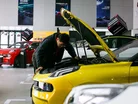Electric vehicle manufacturing may present skills disparity

Navigating the overhaul of an age-old industry is, by all means, a necessary task, but the European markets are anxious of gaps in available skills.
Anticipation is due to the rapid adoption of electric vehicles (EVs) and the fact that the majority of the automotive workforce is well-equipped with the knowledge and skills to take on internal combustion engine (ICE) builds. This could prove an issue as more companies adopt and less personnel are unprepared for the move.
The industry is booming at the moment, so the question to arise from this is: How will the workforce cope in a rapidly evolving industry.
Is the EV boom happening?
Firstly, some optimistic insight into the industry at present.
Due to concerns around the climate and the realisation of the transport industry's impacts on carbon emissions, the EV rollout is happening faster than the media can portray it. Not only are we seeing more electrified vehicles on the roads, but widespread infrastructure development is underway to ensure there are no travel limitations as a result.
However, in countries like the UK where prices for energy are rising, there are concerns that businesses will struggle to present their wares as more cost-effective options. This is influenced by the reduced fuel prices—particularly petrol—which has seen more interest reverting to it over recent months.
Equally important is transparency—how do drivers know their vehicles are sustainable? Particularly when cost is such a critical factor in choosing transport, how will electric cars become cheaper to buy and run than conventional ICEs? These important questions will be determined by the future actions of the industry to incentivise the shift to EVs, but also the sentiments of consumers towards sustainability over the cost.
Despite such concerns, the UK alone is seeing a significant increase in the uptake of EVs. The Society of Motor Manufacturers and Traders (SMMT) recognised that in 2022, there were 234,066 factories in the country producing battery-electric vehicles (BEVs). Those factories accounted for a 30.2% share of total automotive production—with an increase of BEV production by 4.8% and hybrid-electric vehicles (HEVs) at 4.3%.
An automotive skills gap is coming
With such significant transition in the automotive sector comes impacts in other areas, such as employment. According to the Institute of the Motor Industry, roughly 16% of technicians in the UK held the relevant qualification to work on EVs, which is fairly minimal considering the last ICE car is expected to be sold by the end of 2030. From this point, the industry will be looking to ensure all-electric is achieved within a five-year period.
“The IMI predicts that the number of IMI TechSafe qualified technicians required to work with electric vehicles by 2030 is 77,000, increasing to 89,000 by 2032,” the Institute explained.
“Aligned to AutoTrader predictions, this suggests the skills gap—when there won’t be enough technicians to service the electric vehicle parc—will appear in 2029."
We've also seen from recent news that the UK is capable of employing a large number of people as supporting industries like battery manufacturing require thousands of individuals to enable the yet-to-be-opened gigafactory in the UK. According to the Founder of Recharge Industries who took the helm following Britishvolt's collapse, David Collard explained that, once operational, the gigafactory would provide around 8,000 jobs for residents of the UK.


